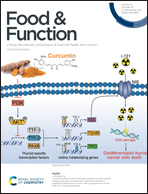Lactobacillus paracasei ameliorates cognitive impairment in high-fat induced obese mice via insulin signaling and neuroinflammation pathways†
Abstract
Long-term consumption of a high-fat diet (HFD) can cause glucose and lipid metabolism disorders, damage the brain and nervous system and result in cognitive impairment. The objective of this study was to investigate the preventative effects of Lactobacillus paracasei (Jlus66, a probiotic extracted from cheese in Northeast China) on cognitive impairment associated with HFD. The water maze was used to compare memory changes in mice fed HFD with or without Jlus66. Hippocampal tissue morphology was examined using H&E staining. The expression of neurotrophic factors BDNF, PSD95 and SNAP25, insulin resistance related proteins IRS-1, AKT and GSK3β, and inflammatory related proteins JNK and p38 were detected using western blotting. The results showed that Jlus66 significantly increased the expression of BDNF, PSD95 and SNAP25 (p < 0.01, respectively), increased expression of p-AKT (p < 0.05), p-IRS-1Y612 and p-GSK3β (p < 0.01, respectively), and reduced the expression of p-IRS-1S307, p-JNK and p-p38 (p < 0.05) compared with the HFD group. We conclude that Jlus66 can ameliorate cognitive impairment via insulin signaling and neuroinflammation pathways.



 Please wait while we load your content...
Please wait while we load your content...